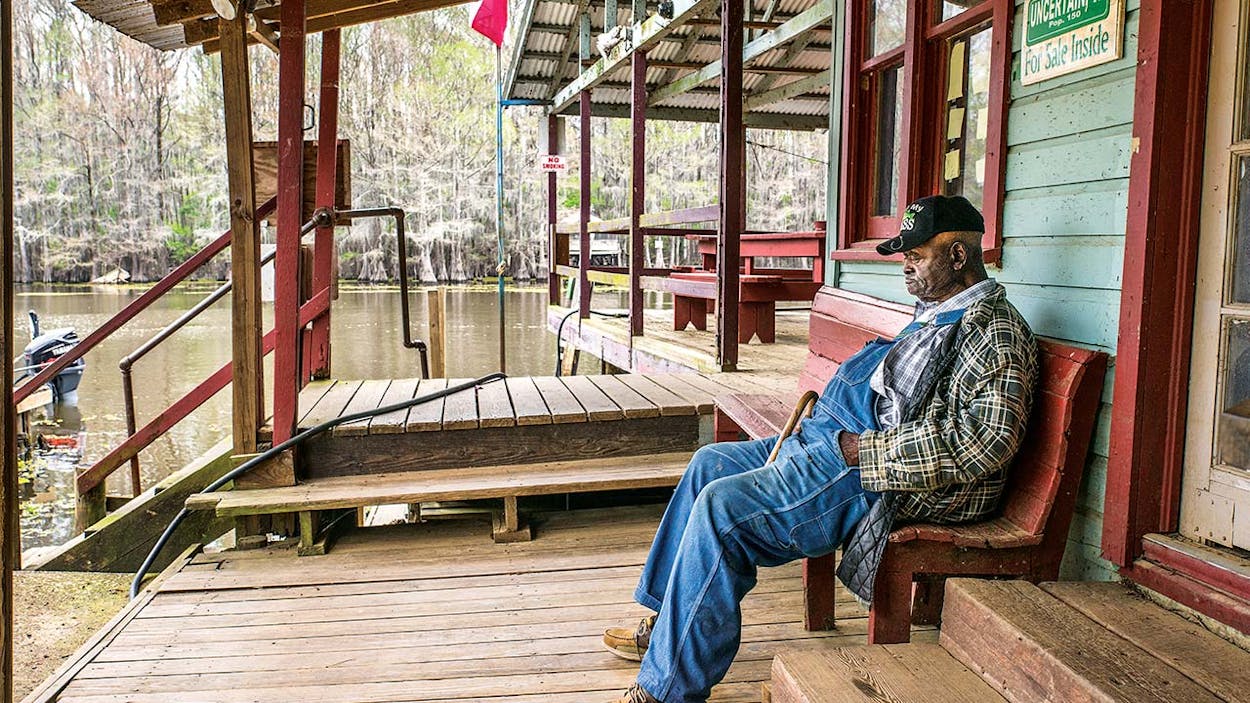Nobody told Henry Lewis he was supposed to be fishing. Either that, or he forgot. It was past daybreak on Caddo Lake, and two well-heeled fishermen were waiting for him, life jackets in hand.
“Henry’s awake because his door’s open,” said Angie King, who works the counter at Johnson’s Ranch Marina, where Lewis has guided for more than six decades. “Just give him a minute.”
Lewis, who is 78, lives up the hill from the marina in Uncertain, a village marooned in the swamp five miles west of the Louisiana line. The town of 94 bayou folk, retirees, and reputed outlaws is the unlikely subject of a new documentary, Uncertain, which has mesmerized critics with its panoramas of Caddo Lake and portraits of residents like Lewis. The film premiered on March 6 to a sold-out crowd in Marshall, the nearest town with a movie theater. Lewis attended the film’s New York debut, which he enjoyed, although he seemed just as impressed by the number of yellow cabs he saw.
In the film, subtitles help viewers follow along as Lewis tells his story. At times, his mumbled drawl can be difficult for even lifelong friends to decipher, though there’s no mistaking the regret in his voice when he describes the time he killed a man in 1971. “I know I’ve done wrong,” he says in one of the film’s most-quoted lines, “but I know I’ve done good. And I pray to God that my goodness outweighs my wrong.”
On this particular late March morning at the lake, spring was coming on. The Texas side of Caddo is a maze of bayous, swamps, and sloughs. As Lewis’s clients waited for him to arrive, rafts of invasive giant salvinia drifted in the slow current and seemed to ooze around the marina’s boat ramp and wood-plank dock. The noxious, lilylike fern doubles in size every four to ten days, choking out the native plants and leaving whole sections of Caddo impenetrable to almost every type of boat.
While another guide topped off the oil and gas in Lewis’s johnboat and got it running, King chatted with the customers until she saw Lewis emerge from his house. “Oh, here comes Henry,” she said. “They drug him up.”
An elderly man in overalls hobbled toward the water, his weight held up by a wooden cane. As he stepped onto the marina, King noticed that his laces were undone and tied them. She helped him into the boat, and the fishermen climbed in too. “I’ve never fished with a movie star,” cracked Alan Haynes, a first-time client from Tyler. Lewis grinned and mumbled a reply, and they were off.
In the first half of the twentieth century, when Caddo was the only major inland lake in Texas, Uncertain was a busy place. Dozens of guides, most of them black, earned meager livings ferrying men, most of them white, to promising fishing spots. With the construction of reservoirs closer to Dallas and Houston, and the advent of high-speed bass boats, demand plummeted for guides who pulled oars and used cane poles to bob for panfish. Lewis is among the last of his kind.
“Most all the old-timers are gone, but Henry still fishes every day,” said Billy Carter, a fellow guide and the owner of Johnson’s Ranch. “I guess his kids cook the fish for him. Angie feeds him half the time. We all try to take care of Henry.”
When Lewis and his clients returned to the marina that afternoon, he posed for a photo with the fishermen and then took his usual seat on a bench overlooking the bayou and the mats of salvinia drifting with the wind. “I’m scared of this here,” he said. “That stuff will kill the lake.” But it won’t keep him away. “If I can get one foot the hell up and move around, I want to be out there fishing. That’s what I want to be doing. I’d as soon be pulling on one more fish before I leave here.”
Lewis watched the water. He drank a Dr Pepper, ate a few cheese crackers, and mulled over whether to walk home or go fishing. Then he went fishing.
- More About:
- Film & TV









